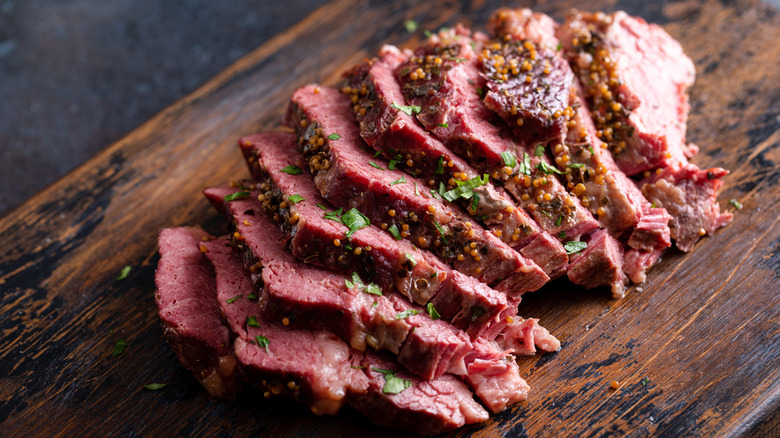The Essential Ingredients You Need For Corned Beef, According To An Expert
Corned beef (which differs from salt beef) is tender, flavorful, and salty, thanks to an intense days-long curing process. While you can pick up corned beef at the supermarket, you may be curious how to make it yourself. Food Republic spoke to Sarri Harper, owner of Carnegie Deli, to find out what she considers to be the essential ingredients for curing your own corned beef at home.
When making your shopping list, you'll want to add kosher salt, pink curing salt, sugar, garlic, bay leaves, black peppercorns, mustard seed, and allspice to it. "These aren't just ingredients — they're the building blocks of flavor and preservation," Harper said. In fact, both types of salt play a key role in curing meat. Kosher salt helps to remove water, add flavor, and act as a preservative. Alternatively, curing salt contains both sodium nitrate and sodium nitrite, which helps stop bacterial growth as well as add color to the final product.
Of course, the cut of beef you use for corned beef is just as important as the rest of your ingredients. "Brisket is the gold standard — its fat and muscle structure make for a flavorful, tender result," Harper explained. When in doubt, she said to just look for good marbling, which indicates that a cut of meat has a decent amount of fat running through it, making it much more tender once cooked. That, Harper noted, or a cut that can handle a long cure and slow cook, like a bottom round, means you're in business.
More tips for curing your own corned beef
There are various types of curing techniques, including dry curing and wet curing. The method used for corned beef (and also for pastrami, corned beef's delicious cousin) is wet curing — using a brine to get the job done. Once you're ready, you'll want to start by making the brine. According to Sarri Harper, this step is where you'll combine water, kosher salt, pink curing salt, sugar, and your classic pickling spice. "Submerge a brisket fully in the brine and refrigerate for [five to seven] days, turning daily," Harper instructed. You can even weigh it down with an object on top, like a large can of beans, to ensure it's fully submerged.
Once it's fully brined, rinse the meat to remove excess salt, and then let it simmer along with a fresh batch of spices for about three to four hours, or until fork tender, Harper said. Once it's ready, she suggested slicing it thinly, and against the grain, for the best pieces of meat. You can pile it on some rye bread for a hearty sandwich, break it down to make some corned beef hash, or serve it alongside a side of boiled potatoes and cabbage for a less-than-traditional St. Patrick's Day meal.


